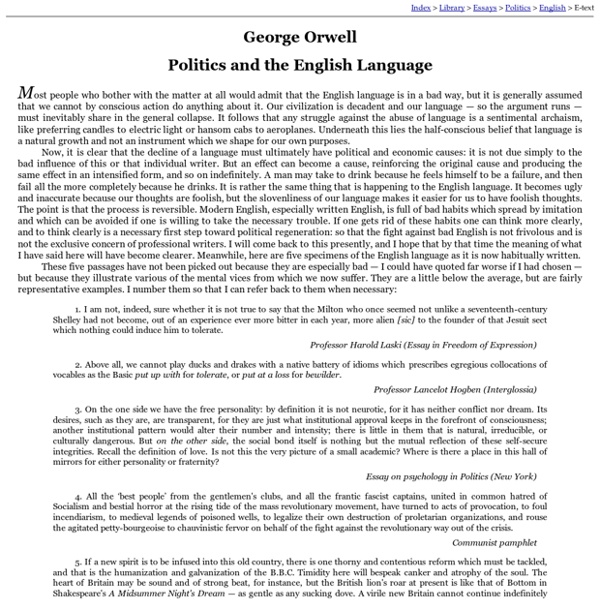English Grammar
Integral Enlightenment - Thank You
Welcome to Integral Enlightenment! I’m delighted to have you with us in this exploration of what it means to live an authentic spiritual life in today’s world. You can listen to your Free Guided Meditation by clicking on the link below. FREE DOWNLOAD: "Opening to the Great Perfection" (50MB MP3 File) You’ll soon begin receiving our Integral Enlightenment e-newsletter, filled with practical spiritual advice and insight to help you deepen your practice and discover the richness of participating in the great adventure of conscious evolution. I would also like to invite you to join me for my upcoming telecourse, Integral Enlightenment: Awakening to an Evolutionary Relationship to Life. I look forward to meeting you on the path! Craig HamiltonFounder, Integral Enlightenment
Facebook Timeline Privacy Tips: Lock Down Your Profile
Facebook's Timeline is coming, whether you like it or not, to Facebook accounts everywhere - including yours. I've been using Timeline for about a month now, and I'm not sure how I feel about it. On the one hand, it's a lot easier to find things -- events, wall posts, etc, because you can now search your Facebook profile by date. On the other hand, it's much easier for other people--friends, strangers, you name it -- to find things, because they can now search your Facebook profile by date. Timeline Tell-all As it turns out, I've posted a lot of things -- not all of which are totally tame and/or work-appropriate -- over the past eight years that I've had Facebook. While it's true that you could technically see these posts before the introduction of Timeline, you would have had to do a lot more work. But now they can just see those posts by going to the right side of my profile and hitting 2006 -- and then choosing the month they want to see posts from. So here's how to fix that. Good Luck
Poetry Season - Homepage - Discover and vote for your favourite poet
Inviting Fear
Above all, a materialistic society desires certainty—it seeks to guarantee it; passes laws to enforce it; wipes our the pathogens that threaten it; and lets everyone have guns to protect it. Even the seemingly innocuous habits of inking in plans and clinging to beliefs and opinions are the reverse-image of the uncertainties that the heart yearns to be certain about. Yet, if we seek security in that which is inherently uncertain, dukkha, or discontent, is the inevitable result. Fear is a discomfiting friend. The impulse is to get to a place of safety, but where in the phenomenal world—either mental or physical—could that be? The insight of the Buddha, informed by his own experiences of exploring fear and dread, encourages us to make a 180-degree turn. For that which is threatening to the ego is liberating for the heart. By turning to face the inarguable facts of nature, the habit of investing in unstable realms is interrupted. How can we arrive at such security? Where do I feel the fear?
Future - Science & Environment - Will we ever... talk to the animals?
History is littered with animals who have "communicated" with humans, but as work with dolphins shows it is difficult to strike up a two-way conversation. “What’s that Flipper? The treasure is over there?” So went a typical plotline for the popular TV series featuring the cute, bottlenosed dolphin who could communicate with his human guardians, and who – in the time-honoured fashion – used his animal powers to apprehend criminals. The idea that animals like Flipper can communicate with humans is not just the preserve of the small and big screen. History is littered with celebrity animals who have communicated with human scientists, with varying degrees of success. Dolphins hold a particular fascination; we are captivated by their intelligence and beauty, and swimming with dolphins features regularly on lists of things to do before you die. One-way chat “Talk” is tricky to define. The idea of talking to dolphins has a long and chequered history. Little less conversation Herzing disagrees.
Future - Science & Environment - Searching for a cure to violence
Can science help understand what leads people to commit violent acts... and find ways to stop them? When a crowd attacked the US consulate in Benghazi, Libya, killing several people including the US ambassador, it was initially seen by some as part of a rising tide of religiously-motivated violence. Others now suggest it was part of a planned attack by a militant jihadist group. While US investigators try to pinpoint exactly what happened, a small group of researchers will be watching closely. For Pete Hatemi, searching for answers to these questions has led him to study groups as diverse as Buddhist monks and Palestinian militants. One popular area of research, which Hatemi is involved in, is looking at the so-called “warrior gene”, also called MAO-A. ‘Insane game’ Hatemi is careful to point out that genetics, like environment, is merely one facet of aggression. While Hatemi is traveling the globe looking at the effects of real-world violence, Rene Weber is taking a different approach.



